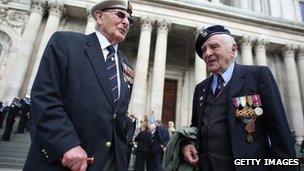UK remembers Battle of the Atlantic 70 years on
- Published
Veteran Derek Traylen: "The Battle of the Atlantic almost crippled this country"
The Battle of the Atlantic, the longest continuous military campaign in World War II, is being commemorated in a series of events.
Three Royal Navy warships arrived in London on Wednesday before a special evensong service at St Paul's.
The events mark the 70th anniversary of the climax of the battle, May 1943, when Germany's submarine fleet suffered heavy losses in the Atlantic.
The milestone is also being marked in Londonderry and Liverpool.
Commemorations take place in London between 8 and 13 May, in Londonderry between 10 and 12 May, and in Liverpool between 24 and 27 May.
'U-boat peril'
Organisers have planned fly-pasts, memorial services and parades to honour those who lost their lives.
On 9 and 11 May at 19:00 BST, fly-pasts are expected over Greenwich. And the warships visiting London will be open to the public on 11 and 12 May.
Admiral Sir George Zambellas, the First Sea Lord and Chief of the Naval Staff, was among the hundreds of current service personnel to join veterans of the Royal Navy and Merchant Navy at the St Paul's Cathedral service.
The event was followed by a reception in the City of London.
HMS Illustrious docked on the Thames at Greenwich on Wednesday, following the arrival of HMS Blyth and HMS Edinburgh, which both moored near Tower Bridge earlier in the week.
Ebrington is set to be the focal point of commemorations in Londonderry, with a guard of honour and a new statue dedicated to those who lost their lives in the battle on 11 May, and a parade on 12 May.
Londonderry was the Allies' most important escort base during the Battle of the Atlantic. At one time, 140 Allied escort ships were based on the Foyle.
Up to 25 ships from the Royal Navy and around the world will arrive in Liverpool - destination of many wartime Atlantic convoys - ahead of a service of commemoration at the city's Anglican Cathedral on 26 May.
The Battle of the Atlantic was fought for control of vital supply routes, beginning as war broke out in 1939.
German submarines were the Allies' principal threat at sea. Winston Churchill once wrote: "The only thing that really frightened me during the war was the U-boat peril."
Skirmishes in the Atlantic continued until the war ended in 1945, but the Allies sank particularly large numbers of U-boats in May 1943, effectively winning the Battle of the Atlantic.
'This is war'
Over the course of the battle, thousands of merchant ships and tens of thousands of lives were lost.
In an interview with the BBC, Derek Traylen, who was a teenage signalman in the transatlantic convoys of supply ships, recalled: "I was on watch, and I saw a torpedo coming straight for us... it went straight ahead of us; missed us by yards.

The veterans were joined at St Paul's by hundreds of current members of the Royal Navy
"It went into the convoy, and it hit a ship in the second column, because they always put the dangerous ships like ones carrying fuel or ammunition [there], and it hit one. And nothing seemed to happen for a minute, and then suddenly it blew up completely and disappeared.
"Not a case of sinking down into the sea. No, it disappeared completely. Of course, everyone was lost on it. But you got to that state of mind, 'Oh well. This is war.' "
Thousands of veterans are expected to take part in the events in Liverpool, the wartime home of the Western Approaches Command, which co-ordinated the effort to protect merchant shipping from the German navy in World War II.
The Ministry of Defence said in 2003 that the 60th anniversary would be the final official commemoration of the battle.
Liverpool hosted the 60th anniversary events, during which nearly 2,000 guests, including hundreds of veterans and former merchant seamen, attended a memorial service at the city's Anglican Cathedral.
- Published9 April 2013
- Published4 September 2011